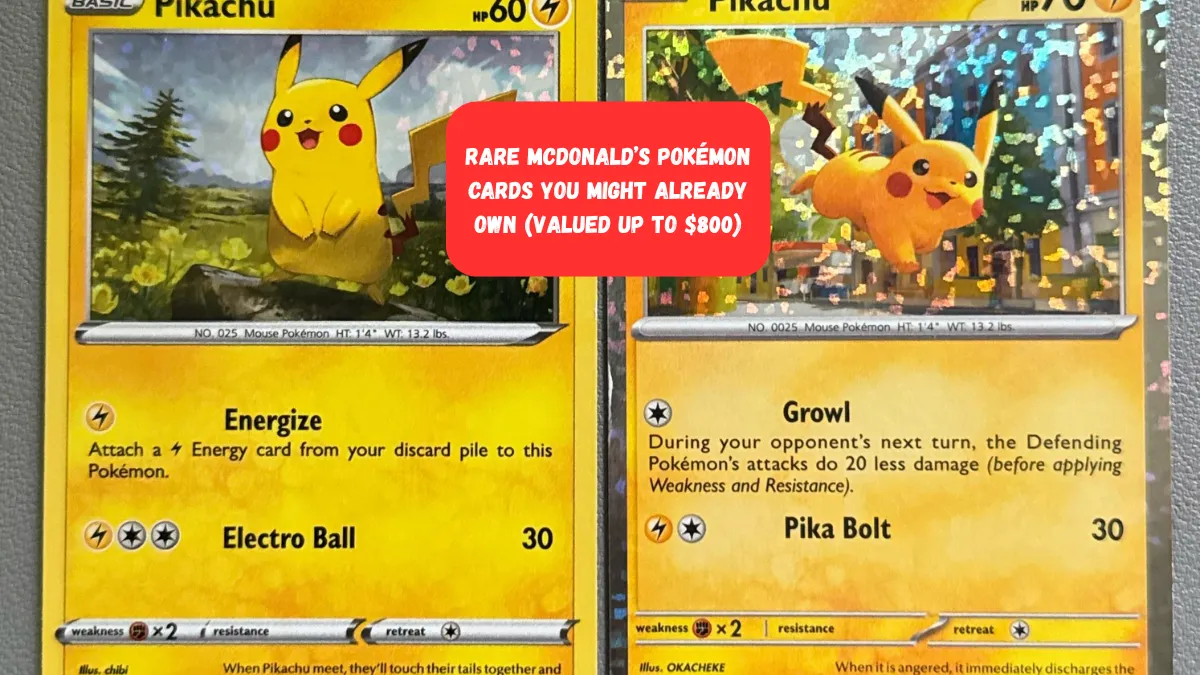McDonald’s promotional Pokémon cards have recently experienced a notable rise in value, with some rare cards now fetching prices as high as $1,500 in the resale market. This increase largely stems from the 2021 partnership between McDonald’s and The Pokémon Company, which celebrated Pokémon’s 25th anniversary.
The promotion featured 50 cards—25 distinct Pokémon, each available in both standard and holographic versions—distributed through Happy Meals. Among these, the holographic Pikachu card has gained significant attention, with PSA 10 graded examples selling for around $275. The blend of nostalgia, limited availability, and Pokémon’s lasting popularity has pushed collectors to pay premium amounts for these collectibles.
Factors Contributing to the High Demand
Multiple elements have fueled the soaring demand for McDonald’s Pokémon cards. The promotion’s limited-time availability encouraged urgency among collectors. Additionally, the COVID-19 pandemic in 2021 led many people to develop new hobbies, including collecting, while spending more time at home.
The role of influencers, such as Logan Paul showcasing their Pokémon collections on social media, also amplified public interest. This mix of scarcity, increased leisure time, and influencer endorsements created ideal conditions for a spike in demand and prices for these promotional cards.
The Role of Grading and Condition in Valuation
The condition of a Pokémon card is crucial in determining its market value. Professional grading services, like PSA (Professional Sports Authenticator), play a significant role by certifying the card’s authenticity and quality. Cards that receive a top grade of 10—indicating gem mint condition—can command much higher prices than ungraded or lower-graded cards.
For example, a 2002 Japanese McDonald’s holographic Pikachu card graded PSA 10 recently sold for $1,902. Grading gives buyers confidence in what they’re purchasing, making high-grade cards highly desirable among collectors and investors alike.
The Impact of Scalping and Reselling
The popularity of McDonald’s Pokémon cards has led to challenges with scalping and reselling. Some buyers purchased excessive amounts of Happy Meals just to collect as many promotional cards as possible, causing shortages that made it difficult for casual collectors and children to obtain them. In response, McDonald’s implemented purchase limits to reduce bulk buying and improve availability.
Despite these efforts, the secondary market saw many sellers offering unopened packs and complete sets at inflated prices. This situation illustrates the difficulties companies face in managing promotional campaigns while maintaining fair access for all customers.
Long-Term Investment Potential
Although the current market for McDonald’s Pokémon cards is strong, their long-term investment outlook is less certain. The value of collectibles tends to fluctuate with market trends, changing nostalgia, and new generations of collectors. Still, some factors indicate these cards might maintain or increase their worth over time.
Their limited print runs, the cultural importance of Pokémon, and the historical significance of the 25th-anniversary collaboration all contribute to their appeal. Collectors interested in investing should aim for high-grade versions of the most popular cards, like the holographic Pikachu, and stay informed about market developments to make strategic choices.
Bottom Line
The rising demand for McDonald’s Pokémon cards underscores the powerful influence of nostalgia and scarcity in the collectibles market. While certain cards, especially the holographic Pikachu, have achieved impressive prices, their future value is unpredictable.
Prospective investors should prioritize acquiring well-preserved, professionally graded cards, but casual collectors need to be aware of the market’s volatility and potential overvaluation. Ultimately, these cards represent more than just collectible items—they serve as a nostalgic link to one of the most beloved franchises worldwide.
FAQs
Why are McDonald’s Pokémon cards so expensive?
The high costs are mainly due to nostalgia, limited availability, and a surge in collectible interest during the pandemic.
Which McDonald’s Pokémon card is the most valuable?
The holographic Pikachu from the 25th-anniversary set stands out as the most valuable, with mint-condition versions selling for hundreds or even thousands of dollars.
Are McDonald’s Pokémon cards a good investment?
While some cards may increase in value, the collectible market is unpredictable, so investing should be done carefully.
How can I tell if my McDonald’s Pokémon card is valuable?
Factors like rarity, condition, and professional grading determine the card’s worth.
